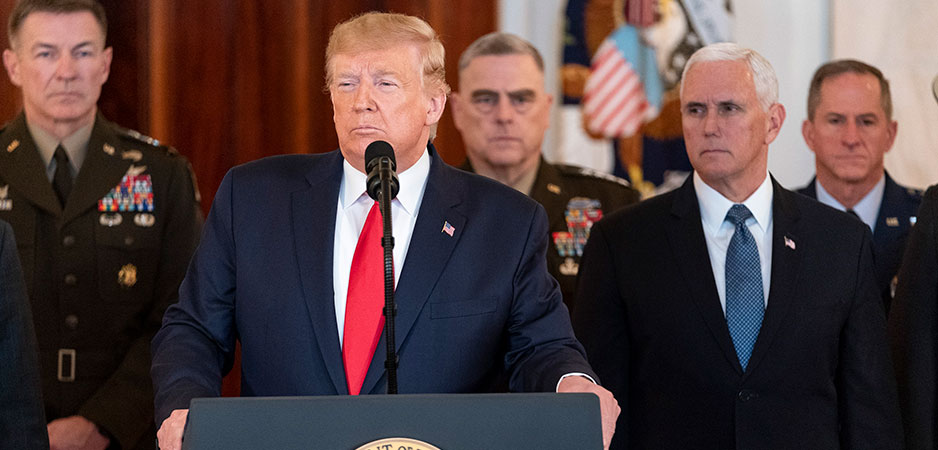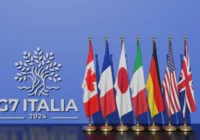In an article with the title, “’Maybe we will, maybe we won’t,” The Independent quotes US President Donald Trump’s latest boast made in an interview with Fox News commentator Laura Ingraham: “The only troops I have are taking the oil, they are protecting the oil.”
It’s Time for America to Join the ICC
The British newspaper comments: “Trump has renewed his threats to forcibly steal oil from Syria, a move which experts say would amount to a war crime” before adding, “such a move would likely constitute pillage and looting.” The article concludes with this reminder: “The Geneva Convention, which the US is a signatory to, explicitly prohibits the looting of property during conflict as a war crime.”
Here is today’s 3D definition:
War crime:
An essential tool in Donald Trump’s geopolitical version of “The Art of the Deal,” which allows the dealmaker to use the threat of a war crime to get leverage in a negotiation knowing that if the negotiator has enough political or economic clout, the execution of that war crime will never be punished
Contextual Note
In its article on the subject, Encylopaedia Britannica announces the ambiguity from the get-go: “The term war crime has been difficult to define with precision.” Laws that cannot be defined are particularly difficult to enforce. And when the first law of geopolitics appears to be that if there’s an advantage to be had, take it now and account for it later, no one should be surprised that war crimes are as easily committed as they are plausibly denied.
The first line of denial is that we were responding to a threat or an emergency. This is the line the US most recently adopted to explain away the crime of targeting and killing a military commander, Iranian General Qassem Soleimani, of a country the US was not officially at war with. The killing took place on January 3 in Iraq, a third country that was uninformed of the US’ intention to carry out the airstrike. The defense based on the idea of imminent threat tends to be very effective as it appeals to the average person’s instinct to celebrate decisive action in the face of any danger. Popular entertainment has used this rationale to justify otherwise criminal actions by heroes in films and TV series.
Although Congress has impeached Trump for the crime of making possible illicit suggestions in a phone call, the president may be guilty of numerous war crimes involving the sacrifice of human life simply by virtue of the unrelenting military aggression of the US in various theaters of war. These include places in which the US has been the direct perpetrator or acted as a committed accomplice, as in the case of US support for Saudi Arabia’s war on Yemen that has contributed to creating the world’s worst humanitarian disaster.
Ironically, those who characterize Trump’s recently expressed intentions as potential “war crimes” have focused not on the loss of human life, but on what may be called property crimes: theft (of oil in Syria) and destruction of cultural sites (in Iran). But, of course, until Trump actually manages to attack cultural monuments, he will be accused of nothing and, if carried out, such crimes would probably be written off as mistakes or simply collateral damage. Stealing Syria’s oil may sound pretty bad in terms of the law, but it’s unlikely to get enough people excited enough to make the case for prosecuting a war crime. It does, however, make for good headlines in the media.
There is even an appropriately comic side to this story. Everyone knows that Trump wants to withdraw US troops from the Middle East, against the objections of military strategists and, more generally, the national security state and the military-industrial complex. Writing for The Independent, Tim Wyatt offers this fine bit of analysis: “Some commentators have speculated that defence officials desperate to persuade the president to permit some US forces to remain in Syria as a counter-balance to [the Islamic State group] and the Assad regime were forced to appeal to his oil-obsession to gain his approval.”
In the same Laura Ingraham interview, other quasi-comical Trump moments appear in the transcript. When asked to reveal the facts about the supposed imminent planned attack that justified killing Soleimani, Trump replied, “I can reveal that I believe it would have been four embassies.” He might have said with equal sincerity and far more basic truth: I can reveal that I believe everything I hear on Fox News. Or even: I can reveal that I believe that all women are fatally attracted to me. Revelations about his personal beliefs have no bearing on reality.
Gently pushing him a little further, Ingraham confronted Trump with the devastating public criticism his friend and “supporter” Utah Senator Mike Lee made of the administration’s Intel hearing that was called to justify the threat. Lee called the hearing “insulting and demeaning.” Trump countered: “[S]ome of the congressmen said it was the single best briefing. One person said they have been there for 10 years.” Then, suddenly worrying that 10 years might not be enough to seal the deal, Trump added: “It’s the single best briefing they’ve ever had. One said 20 years, the single best military briefing they’ve ever had.”
When it came to embassies under imminent attack, Trump had only one to start with, so to support his lies, he multiplied by four to produce a more convincing number. As 10 years of attending hearings seemed not quite persuasive enough, doubling it to make 20 would undoubtedly do the trick. Multiplying by more than two might have strained belief. But Trump knows that on Fox News, there’s no risk that anybody’s belief will be strained.
Historical Note
War crimes come in different varieties. Many have claimed that George W. Bush, Dick Cheney and Donald Rumsfeld — to name only those at the highest level of decision-making behind the launch and prosecution of still enduring Middle East wars of the 21st century — were guilty of war crimes. They deliberately lied about the reasons for invading Iraq in 2003, which resulted in the death of hundreds of thousands of Iraqis and a long series of immeasurable human tragedies, many of them directly costly for the US itself.
Just this week, retired Colonel Lawrence Wilkerson, who participated in the fabrication of the Bush administration’s lies alongside Colin Powell, has accused the administration he worked for of a specific war crime, underlining the fact that things have become worse today. “We have just, as we did with torture from 2002 to 2007, 2008, as we substantiated for the world that torture was OK, we have now OK’d the killing of recognized members of other states’ government,” he said.
Wilkerson predicts that the current US administration is “going to lie, cheat and steal, as [Secretary of State Mike] Pompeo is doing right now, as Trump is doing right now, as [Defense Secretary Mark] Esper is doing right now, as [Senator] Lindsey Graham is doing right now.” Wilkerson also identifies the reason why the persistence in war crimes appears to be inevitable: “America exists today to make war … It’s part of what the American Empire is.” Empires always have more leeway to commit war crimes than others.
No one has sought to bring any of those responsible for US war crimes to justice. Americans, in particular, prefer to honor them as “serious” decision-makers who dealt with the emergencies of the past. Barack Obama, who won the 2008 presidential election thanks to his opposition to the Iraq War, once in office claimed that there was no constructive reason for accusing people in the Bush administration of war crimes. The past was the past. It was more important to focus on the future, one in which more war crimes might be committed.
For the eight years he was in office, Obama not only continued the wars he appeared formerly to consider criminal, but he innovated, particularly in the use of lethal drone technology. To the degree that drones terrorize entire populations, this would constitute a very real example of state-sponsored terrorism and could easily be interpreted as a new form of war crime.
Impunity appears to be the rule, though the International Criminal Court (ICC), created nearly two decades ago, has attempted to stand as an institution that will discourage and punish war crimes. “The statute provided the ICC with jurisdiction for the crimes of aggression, genocide, crimes against humanity, and war crimes. The court came into existence on July 1, 2002, and by 2016 the statute had been ratified by some 120 countries; three of the permanent members of the UN Security Council (China, Russia, and the United States), however, had not yet approved it.”
Without the active support of Washington, the ICC has no real power and has disproportionately prosecuted African nations. Speaking for the US, who theoretically accepts its existence but refuses its jurisdiction, former National Security Adviser John Bolton recently called the court illegitimate.
The idea of war crimes will always feed dramatic headlines in the media and stimulate a sentiment of indignation in the hearts of those who object to the policies of the governments thus accused. But the idea that the prospect of imminent or even eventual justice might even begin to worry the perpetrators of war crimes remains totally unrealistic.
*[In the age of Oscar Wilde and Mark Twain, another American wit, the journalist Ambrose Bierce, produced a series of satirical definitions of commonly used terms, throwing light on their hidden meanings in real discourse. Bierce eventually collected and published them as a book, The Devil’s Dictionary, in 1911. We have shamelessly appropriated his title in the interest of continuing his wholesome pedagogical effort to enlighten generations of readers of the news.]
The views expressed in this article are the author’s own and do not necessarily reflect Fair Observer’s editorial policy.
Support Fair Observer
We rely on your support for our independence, diversity and quality.
For more than 10 years, Fair Observer has been free, fair and independent. No billionaire owns us, no advertisers control us. We are a reader-supported nonprofit. Unlike many other publications, we keep our content free for readers regardless of where they live or whether they can afford to pay. We have no paywalls and no ads.
In the post-truth era of fake news, echo chambers and filter bubbles, we publish a plurality of perspectives from around the world. Anyone can publish with us, but everyone goes through a rigorous editorial process. So, you get fact-checked, well-reasoned content instead of noise.
We publish 2,500+ voices from 90+ countries. We also conduct education and training programs
on subjects ranging from digital media and journalism to writing and critical thinking. This
doesn’t come cheap. Servers, editors, trainers and web developers cost
money.
Please consider supporting us on a regular basis as a recurring donor or a
sustaining member.
Will you support FO’s journalism?
We rely on your support for our independence, diversity and quality.






